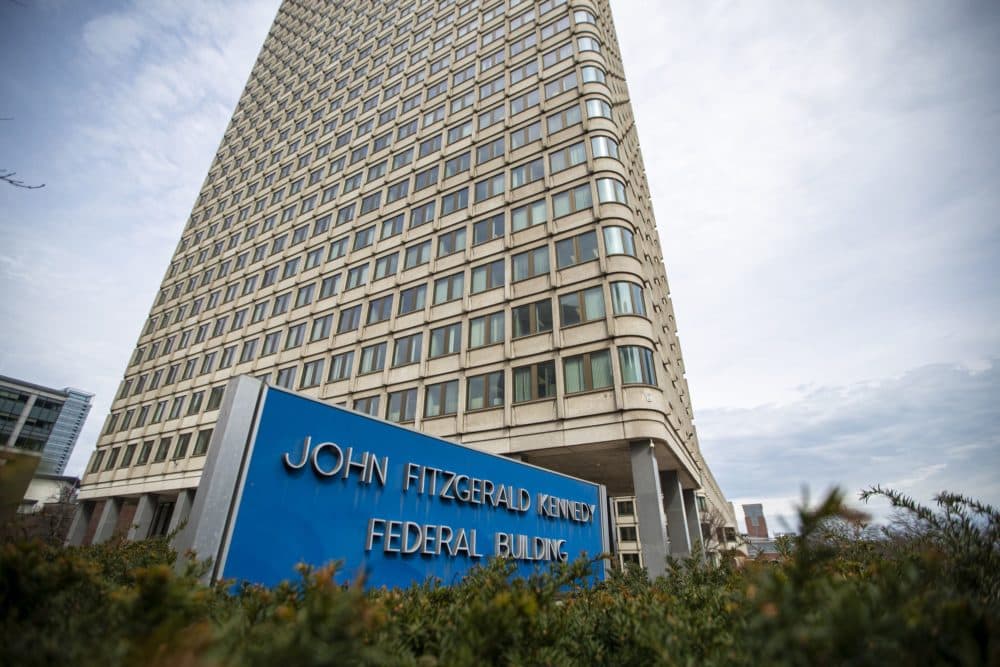Advertisement
Boston's Immigration Court Set To Reopen. Critics Say It's Too Soon
Resume
En español, traducido por El Planeta Media.
Boston's immigration court is among a handful of those nationwide scheduled to reopen Monday for what are called non-detained cases — hearings for individuals who aren't currently jailed in federal detention.
Some immigration attorneys, judges and elected officials worry the Executive Office for Immigration Review (EOIR), the government office which oversees the country's immigration courts, is rushing the reopening and potentially jeopardizing public health.
It's unclear why the EOIR scheduled reopenings only in Boston, Buffalo, Dallas, Hartford, Las Vegas, Memphis and New Orleans, while continuing to postpone non-detained hearings in nearly all other courts through July 10. Honolulu's immigration court reopened for non-detained cases on June 15.
Boston and most other immigration courts have been open for in-person hearings only for those in detention throughout the pandemic.
Eliana Nader is a Boston-based immigration attorney and newly elected chair of the New England chapter of the American Immigration Lawyers Association (AILA). She has multiple concerns about the court reopening, both in terms of stemming the spread of the coronavirus and upholding due process.
"People, because they're so scared of being deported, I fear will go to court even if they're ill," Nader said. "And there's been no guidance as to how we can call and request that somebody not have to show up or how we can have presence waived or anything like that."
Nader said EOIR has informed attorneys that master calendar hearings — days on which hundreds of people show up waiting for their case to be called — continue to be postponed in an effort to avoid drawing large crowds to the courtrooms. But she also said the government hasn't offered any insight into the criteria for opening some courts and not others.
The EOIR did not respond to an email asking for more information.
Sens. Elizabeth Warren and Ed Markey were among lawmakers who recently sent a letter to the director of the EOIR expressing concerns over the timing.
"We fear that you are rushing to reopen the courts without a rigorous process or sufficient communication with stakeholders," the letter read.
Markey and Warren also co-sponsored legislation earlier this month that would stop deportations and postpone in-person court hearings for the duration of the national pandemic emergency.
Judge Ashley Tabaddor is president of the National Association of Immigration Judges (NAIJ), which has been critical of the EOIR's handling of court business throughout the pandemic. Tabaddor said immigration judges have been excluded from the decision making process around reopening.
"We've also heard from the judges that already there are a lot of requests for the cases that are scheduled to go forward this coming week, for those cases to be continued because as you can imagine, people have been pretty much in lockdown for a number of months," Tabaddor said. "Time hasn't been available for the attorneys or for all of the parties to be ready for the court hearing."
Tabaddor added that the NAIJ has no confidence in the government's ability to notify all individuals of their new hearing dates, especially considering the staff shortages across the immigration court system.
Nader said she understands the current circumstances are challenging and that the immigration courts are navigating new territory. But she's worried that confusion around the rescheduling of hearing dates could result in people not showing up for their day in court, especially for the majority of immigrants who are not represented by attorneys.
"Hearings are being either continued very far out or advanced in some cases to next month and attorneys are not receiving notice so I can't imagine that people who are not represented are receiving notice," she said.
If someone misses their preliminary immigration court hearing they are generally considered a no-show and ordered deported "in absentia."
Boston's court has remained open throughout the pandemic to hear the cases of detained individuals, often transporting people out of detention facilities, into courtrooms, then back into the detention facilities. Attorneys expressed concern in March around social distancing guidelines and in one instance, an immigration judge in Boston closed her own courtroom out of concern of coronavirus exposure.
It wasn't until an immigration attorney announced in April that she'd been exposed to a family member testing positive for the virus that Boston's court briefly temporarily closed for all hearings on a Friday. The court reopened for detained hearings the following Monday.
This segment aired on June 29, 2020.
